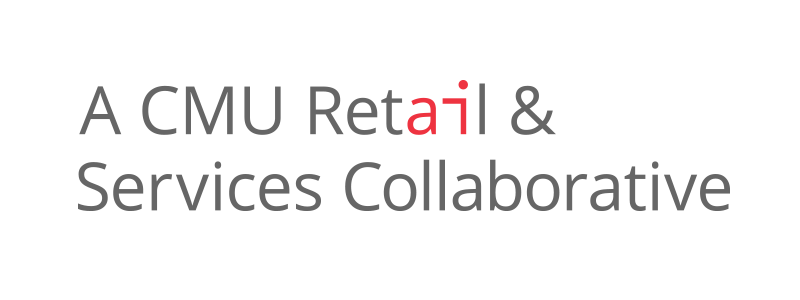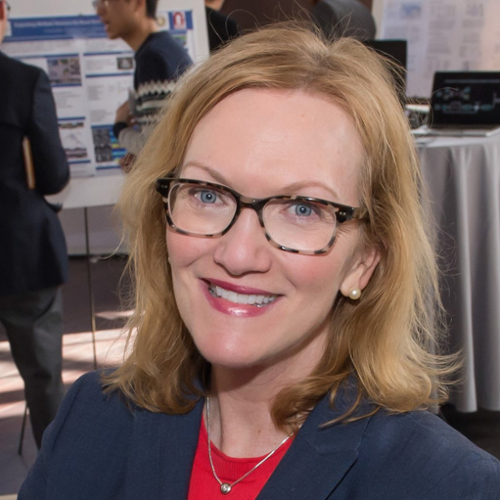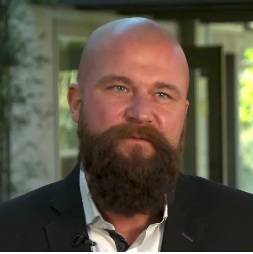
ENAiBLE Activities
In response to industry needs, ENAiBLE hosts roundtable discussions and workshops. These events provide a forum for problem-solving, networking, and gaining access to world-renowned experts in fields including:
-
Service Design
-
Organizational Change
-
Robotics and Automation
-
Data Analytics
-
Responsible Artificial Intelligence
Previous Events
ENAiBLE Panel Discussion: The Last Mile— Challenges for retail and service delivery and employee transportation.
December 14, 2023 | 2:00 to 3:00 p.m. EST
For retailers and service providers, the infrastructure and logistics of transportation, particularly in the “last mile,” create many challenges for the delivery of products and services and for employees trying to reach work destinations. On the delivery side, consumers expect faster, more transparent deliveries, with forewarning of precisely when the item will be placed at their door. For employee transportation, individual vehicles exacerbate the very traffic problems that complicate deliveries. In many cities, public transportation systems are not extensive enough to take employees directly to the employer’s door. These are complex, multifaceted problems with a myriad of technologies, including the promise of AI to power logistics or transportation planning, so where do companies start?
In this webinar, we’ll hear from Karina Ricks, Partner at Cityfi; Karen Lightman, Executive Director of Metro 21; and Sarah Fox, faculty at the School of Computer Science, as they discuss the pros and cons of rapidly evolving technologies touted as the next solution for the last mile. We’ll address questions such as:
- What is the role of retailers and service providers in supporting innovation in the delivery and public transportation sectors? How can retail and service providers work with local, state, and federal governments to encourage support of technology start-ups in these areas of exploration?
- Scooters, bikes, and other short-distance human mobility solutions have complex trade-offs and often create dissatisfaction among community members who do not need these transportation solutions. How can retail and service providers participate in such programs to ensure their employees have these last-mile options?
Join us for a lively discussion of how retail and service providers can interact with and support local, state, and federal governments and technology innovators to tackle these last-mile challenges. The panel discussion will be followed by a Q & A.
ENAiBLE Summer Retail Innovation Program: The Future of Retail & Service
August 8, 2023 | 12:00 to 1:30 p.m. EDT
Carnegie Mellon University students participating in the ENAiBLE Summer Retail and Service Innovation Program will present conceptual future customer experiences. Throughout this 10-week human-centered research and design program, students tackled the project prompt:
Retail and Service industry companies are under increased pressure to deliver more personalized, convenient, and value-priced products and services to consumers while ensuring positive impacts on global challenges such as sustainability, data privacy/security, and social and economic equity. How might these companies continue to deliver high-quality consumer experiences while also safeguarding people and the planet?
Each student team conducted background research, consumer interviews, idea generation, and prototyping activities to develop specific future solutions within the boundaries of this broader project prompt, resulting in each team presenting very different proposed future experiences. This webinar hour will include four student teams presenting their research and proposed solutions with an audience Question and Answer session following the four presentations.
Join us to learn what the next generation thinks future retail and service experiences will be like and how those experiences can also help address important privacy, sustainability, and equality challenges.
ENAiBLE Speaker Session— AI in Practice: Strategy and Execution
April 26, 2023 | 2:00 to 3:00 p.m. EDT
We are in many ways at a perfect time for AI in business. In principle, it has never been easier for businesses to apply cutting-edge AI: data is cheap and easy to collect, and newly-developed machine learning models/algorithms are almost instantaneously commoditized for general use. In practice though, firms still seem to struggle with basic execution of AI projects, and with broader strategy around adopting AI tools.
In an open-ended conversation, Prof. Robert Monroe, Teaching Professor of Business Technologies, and Prof. Andrew Li, Assistant Professor of Operations Research, will discuss:
- What makes project management particularly challenging when AI is involved?
- What are best practices for bringing an AI project to fruition?
- How should firms factor AI into their corporate strategy? Is this even possible given how rapidly AI is developing?
The conversation will continue with open audience discussion, including diving deeper into the challenges and opportunities unique to the retail and service industries.
ENAiBLE Panel Discussion - Digitizing Experiences: Utilizing Web3 & Blockchain Data to Drive Consumer Loyalty
March 22, 2023 | 1:00 to 2:00 p.m. EDT
For retail and apparel companies, elevating customer engagement and loyalty relies on the company’s ability to deliver enhanced value in unique ways to different consumer groups. During this ENAiBLE event, Ari Lightman, Distinguished Service Professor, Digital Media and Marketing, Heinz College of Information Systems and Public Policy, will moderate a discussion of the role of Web3 and blockchain in creating experiential partnerships with consumers that decentralize the ownership of events and experiences, allowing brands and their most loyal customers to craft enhanced value together.
Joining Professor Lightman, Sam Perl from the Software Engineering Institute’s Center for Cyber Security and Scott Likens, Emerging Technology Leader, US, China, and Japan, PwC United States, will share case studies in Web3 and blockchain, discuss risk mitigation strategies, and explore how to scale infrastructure for mass adoption. As retailers think about leveraging these emerging technologies, our panelists are interested in hearing your questions, issues, and concerns, in this “cameras-on,” open audience discussion.
ENAiBLE Panel Discussion: Innovating In-Store Experiences - Fusing Physical & Digital in Consumer Space
December 13, 2022 | 1:00 to 2:00 p.m. EST
-
How do current technologies offer new immersive physical experiences?
-
When does customer interaction offer memorable experiences that accrue value to the brand?
-
What’s emerging that may impact the design of retail experiences?
ENAiBLE Panel Discussion: Robotics in Retail & Service - Considerations for Employees
October 27, 2022 | 1:00 to 2:00 p.m. EDT
Retail and service ecosystems are complex with many interconnected dependencies. Robotics – technologies such as self-checkout, robotic shelf stockers or chatbots – are often implemented to reduce repetitive tasks, increase scale, or aid employee efficiency. When designing new services that rely on robotics and artificial intelligence, many companies focus on the technology and the customer but overlook the impact on their employees, who are the ones who ultimately have a heavy influence on customers' experiences. Successful implementation of robotics relies on the technology working in concert with employees.
In this ENAiBLE panel discussion Dr. Jodi Forlizzi, Herbert A. Simon Professor in Computer Science and HCII, and Associate Dean, Diversity, Equity, and Inclusion in the School of Computer Science, and Dr. Marios Savvides, Bossa Nova Robotics Professor of Artificial Intelligence, Electrical and Computer Engineering and Director, CyLab Biometrics Center, will discuss considerations for your employees when designing new services that rely on robotics and AI.
Dr. Forlizzi is the Herbert A. Simon Professor of Computer Science and Human-Computer Interaction in the School of Computer Science at Carnegie Mellon University. She is also the Diversity, Equity, and Inclusion Lead in the School of Computer Science. She is responsible for establishing design research as a legitimate form of research in HCI that is different from, but equally as important as, scientific and human science research. Jodi has advocated for design research in all forms, mentoring peers, colleagues, and students in its structure and execution, and today it is an important part of the HCI community. Her current research interests include designing human-robot interaction as a service and human-AI collaboration in the domains of eldercare, accessibility, human assistance, and overall well-being.
Dr. Savvides’ research is focused on developing core AI and machine-learning algorithms for robust face detection, face recognition, iris biometrics, and most recently, general object detection and scene understanding. Dr. Savvides’ work includes many commercially released products including most recently when he served as the Chief AI Scientist of Bossa Nova Robotics, where he and his CMU research team, re-built the AI algorithms for Bossa Nova robots for performing real-time inventory analysis and scaling the autonomous robot deployment of this inventory analysis AI from 20 stores to deploying 500 autonomous robots in 500 retail stores while completely removing any Human-in-the-Loop (HITL).
This panel discussion will begin with a conversation with Dr. Forlizzi and Dr. Savvides and then will continue with open Q & A from the audience.
Managing Remote Work: Building Collective Intelligence in the Workplace
September 28, 2022 | 1:30 to 2:30 p.m. EDT
The COVID-19 pandemic created a major upheaval in how work is conducted in many organizations, and now some are struggling to find ways to continue to provide flexibility to employees where possible while still maintaining a collaborative culture and effective operations.
In this session, Prof. Andrew Li, Assistant Professor of Operations Research and a faculty leader with ENAiBLE, a CMU Retail & Services Collaborative, will facilitate a discussion of some of the latest research on collective intelligence conducted by Prof. Anita Williams Woolley, Associate Dean of Research and Professor of Organizational Behavior and Theory at the Tepper School of Business. Prof. Woolley will share some of the findings of recent work demonstrating ways that organizations can manage remote and hybrid work in a manner that promotes collective intelligence in the workplace including examples from retail and service industries.
Recruiting and Retaining Product Managers by Building a Product-Led Culture
May 18, 2022 | 1:00 to 2:00 p.m. EDT
As an emerging profession, Product Managers with specific training and experience are far fewer in number than open positions. Competition for educated and experienced PMs is fierce, and recruiting and retention are often cited as challenges many retail and service companies face, especially when compared to big tech companies with strong product-led cultures. In this competitive environment, fostering a product-led culture can help retailers and service companies attract and retain the most promising candidates, in order to deliver the best products and services.
In a product-led culture, companies move towards customer and product centricity. All organizational units align their strategy, vision, and goals on developing product value and thereby creating great customer experiences. At the center of the product-led culture is today’s Product Manager, a synthesizer of disciplines, capable of bringing the strength of the organizational units together, laser-focused on product delivery and customer satisfaction.
In this roundtable discussion, Product Managers from big box retail, healthcare insurance and digital services will discuss the importance of product-led culture, including:
- Pranita Ramakrishnan, Senior Product Manager, Angi
- Daksh Uday Shah, Senior Product Manager, Walmart Global Tech
- Nehal Gupta, Product Manager, Highmark Inc.
They will be joined by the Executive Director of CMU’s Master of Science in Product Management program, Brad Eiben.
Our panelists will share their thoughts and experiences on:
- What it means to be product-led and communicate this commitment to candidates.
- Advantages retailers and services have over big tech, especially the physical delivery of products and services.
- What steps you can take organizationally to support your Product Managers, including the importance of onboarding and setting growth expectations.
- How to avoid letting your company's technology legacy hamper recruiting and retention efforts.
The conversation will continue with an open Q&A with the audience offering questions, experiences, and challenges related to growing and nurturing a Product Management discipline.
Building Customer Credibility and Confidence in AI-driven Experiences
April 28, 2022 | 1:00 to 2:00 p.m. EDT
It is easy to forget that many of our daily activities generate data, from checking email and visiting websites, to browsing stores and even driving our cars. Data has become the de facto medium through which companies seek to better understand their customers' habits and interests. Tools leveraging AI and Machine Learning are then deployed so as to seamlessly transfer these understandings into experiences and services.
These tools are generally proven “in the lab,” but what happens when they are actually deployed? We frequently hear stories of customer confidence being damaged through poorly-executed strategies and methods. How is a company to navigate leveraging AI-based tools that ultimately impact their credibility and reputation with customers?
Andrew Li, co-lead of ENAiBLE and Assistant Professor of Operations Research, welcomes Matt White, Technology & Innovation Manager at Progressive Insurance, and Frank Liddy, Vice President of Growth at Standard AI.
In this roundtable discussion, we will explore:
- What are typical risks that arise in applying AI to customer-facing processes? Are there ways to identify low-risk/high-reward customer experiences that are ideal for applying AI?
- How challenging is it to recover credibility with your customer? Where should a company draw the line when leveraging AI?
- How can we think about, and even measure, the effect we’re trying to generate from applying AI?
- Broadening the notion of a ‘customer,’ who within the organization can also benefit from AI-driven experiences?
The conversation will continue with an open Q&A with the audience, providing an opportunity to discuss additional questions, experiences, and challenges related to building credibility with customers in AI-driven experiences.
Data Privacy: What Retailers Need to Know
March 30, 2022 | 1:00 to 2:00 p.m. EDT
Smart phones, smart watches, connected cameras, the Internet of Things. We live in a world that is digitally interconnected, from our homes to our offices, to our schools and shopping malls. This unprecedented access to a multitude of sources of data enables us to build a much richer and more vivid understanding of the world we live in, the activities people engage in, and much more. This data can be used to develop safer, cleaner smart cities, enhance people’s everyday lives, including our shopping experiences in the mall and online. But that same data, if not carefully managed, can also lead to excesses with people feeling a sense of violation of their privacy.
What does it take to adequately address expectations of privacy of visitors to both websites and physical retail spaces? What are the new regulatory requirements? What does it take to satisfy these requirements and give people the sense of awareness and control that is so critical to satisfy their privacy expectations? The past several years have seen a significant shift in awareness of digital privacy among both consumers and retailers, as well as the introduction of new, more stringent regulations such as the General Data Protection Regulation (GDPR) or the California Consumer Privacy Act. To what extent do these regulations help? Are they going too far? Are they falling short?
We welcome Norman Sadeh, Professor in the Institute for Software Research at Carnegie Mellon University and Co-Director of the University’s Privacy Engineering Program. In this conversation with Andrew Li, one of our faculty leads of ENAiBLE and Assistant Professor of Operations Research, we will explore:
- The current state of affairs pertaining to digital privacy, and what that means for retailers
- Qualities of an “ideal” privacy practice, and the most common challenges toward this ideal
- Exciting ideas from research in data privacy, including an approach to empower customer choice for what data is collected about them
The conversation will continue with an open Q&A with the audience, providing an opportunity to discuss additional questions, experiences, and challenges related to the broad area of data privacy.
To go deeper on the topic
- Arrange a follow-up discussion with Prof. Norman Sadeh and members of his Lab to explore possible opportunities to partner on one of his projects by emailing his Lab Manager, Ms. Linda Moreci (laf20@cs.cmu.edu).
- Relevant project links:
- The IoT Privacy Infrastructure project: https://www.iotprivacy.io/login
- The Usable Privacy Policy project: https://usableprivacy.org/
The Personalized Privacy Assistant project: https://privacyassistant.org/
Designing Effective Human–AI Collaborations
November 19, 2021 | 1:00 to 2:00 p.m. EST
AI systems are increasingly used to augment human decision-making in complex work contexts, with the promise of overcoming human limitations and biases. Yet AI judgments are themselves likely to be imperfect and biased, even if in different ways than humans. How might we effectively combine the complementary abilities of human and AI decision-makers while mitigating the limitations of each?
In this roundtable discussion, we will explore:
- How are companies currently thinking about human-AI collaboration?
- What are the opportunities and risks in human-AI collaborative work?
- For companies who have implemented human-AI collaborations, what has been successful so far, and what are some lessons learned?
- For companies who are interested in exploring opportunities, when is human-AI collaboration a promising approach? What’s the best way to get started?
- How can companies evaluate the effectiveness of human-AI collaborations? What strategies exist for ensuring that human-AI collaborations bring more benefit than harm?
The conversation will continue with an open Q&A with the audience, providing an opportunity to discuss additional questions, experiences, and challenges related to the broad area of human-AI collaboration.
Harnessing Customer Feedback Data to Measure Your CX Efforts
October 29, 2021 | 1:00 to 2:00 p.m. EDT
Please join us for a vibrant roundtable with CMU faculty in conversation with industry leaders from Wells Fargo and United Concordia Dental. The panel will be led from the professional retail experience of Raelin Musuraca, moderated by Paul Pangaro, both teaching faculty of the HCII and co-leads of ENAIBLE, a CMU Retail and Services Collaborative.
Companies struggle every day with the amount of customer feedback data coming into the organization or being posted in digital spaces -- social media, customer service chat, surveys, blogs, feedback forms, product reviews, just to name a few. Operationally, it can be challenging to staff and support consumption of this data, let alone respond or act upon it in a way that demonstrates to the customer that they are indeed listening and engaged. Voice of the Customer (VoC) programs managed by AI-driven software packages have been suggested as a panacea for this enterprise data management problem, but implementation of such programs is slow, expensive and often do not result in driving actionable improvement recommendations.
In this roundtable discussion, we will tackle:
- How are companies wrangling this data? What has been successful? What are some lessons learned?
- What challenges have companies faced implementing Voice of Customer programs? Where do they fall short? What has worked?
- How can AI-driven analytics be used to monitor and measure “key moments of truth” allowing for continual improvement of the customer experience.
- The ways in which data mining and interactive, real-time monitoring can allow for faster responses to customer problems.
- When it comes to VoC software, what are the capabilities and limitations of AI-driven Analytics and Natural Language Processing? How can outputs from these programs inform your CX measurement efforts?
The conversation will continue with an open Q&A with the audience, including diving deeper into the challenges of using customer feedback data to measure CX in the retail and service industries.
Enhancing Decision-Making through Interactive Data Visualization
September 27, 2021 | 1:00 to 2:00 p.m. EDT
Please join us for a conversation with Dominik Moritz, Senior Project Scientist in the Human-Computer Interaction Institute, and Paul Pangaro, Professor of Practice in the Human-Computer Interaction Institute in the School of Computer Science.
The size and complexity of the datasets we use to make decisions have far outpaced the tools we have today. Artificial Intelligence methods to analyze data and automate processes promise to enhance decision-making but they depend on people to define their goals, check for errors, and ultimately derive value from the results. In this conversation, Dominik will show how data visualizations facilitate human involvement in machine-assisted decision-making. Data visualizations help us understand data, suggest further analysis steps, and communicate insights.
We will discuss how interactive visualizations, in particular, enable analysts, leadership, and frontline employees alike to look at data from different angles. Ultimately, when the story the data is telling becomes clear, better decisions result in enhancing the customer experience. Our conversation will conclude with Dominik showing interactive visualizations tools he and his lab have developed that make it easy to analyze and present data. These tools help everyone become better data analysts and data communicators.
Q&A with the audience will follow.
How to Engage with Research at CMU: Capstone Projects
June 29, 2021 | 1:30 to 2:30 p.m. EDT
One of the easiest and most effective ways for companies to get involved with research at Carnegie Mellon is via Capstone projects. For companies with unique problems, Capstones ideally offer a fast and low-cost path to a dedicated research team. At the same time, it is often challenging to identify when a Capstone is appropriate, as well as to navigate the breadth of options available at CMU. To that end, this session is a crash course on Capstones at CMU. We will discuss:
- Qualities of projects that yield successful Capstones, and how to spot them
- Hurdles that frequently occur (e.g. data and IP), and how to tackle them
- A “map” of the available options at CMU, and their key similarities and differences
As part of this session, we will dive deeper into three diverse Capstones at CMU (Product Management, Business Analytics, and Human-Computer Interaction), and hear directly from the heads of these programs:
-
Alan Montgomery, Professor and Program Head of the Master of Business Analytics
-
Brad Eiben, Executive Director of the Master of Product Management
- Skip Shelly, Professor and Program Director, and Jessica Vogt, Engagement Manager of the Master of Human-Computer Interaction
Learn More About Capstone Sponsorship Opportunities
Enhancing Customer Experience: Hype vs. Reality
Panelists:
-
Jimmy Drake, Vice President of Digital at Purple
-
Raelin Musuraca, Assistant Teaching Professor, Human-Computer Interaction Institute, School of Computer Science
-
Paul Pangaro, Professor of Practice Human-Computer Interaction Institute, School of Computer Science
-
Chris Stephens, Vice President of Enterprise Data & Analytics at Zendesk
June 3, 1:30 to 3:00 p.m. EDT
Focused, data-driven customer experience strategies increasingly rely on the use of sophisticated AI and machine-learning algorithms. The future promises rich and accurate data models, such as digital twins, that will change how retailers present, sell and deliver goods and services. As competitive pressures increase, companies struggle to balance the physical and employee resources needed to fuel, manage, and act upon the insights from increasingly complex models.
In this roundtable discussion, industry and academic leaders will discuss:
- What are the benefits and limitations of using AI models to drive decision-making?
- How can companies separate the hype from reality as they lay the groundwork for an actionable, responsive CX capability?
- What can retailers do today to prepare their operations in order to fully realize the promise of AI technology?
The conversation will continue with rich Q&A with the audience, including diving deeper into the challenges of the retail and service industries.
AI for Marketing: The Bleeding Edge
With Alan Montgomery, Professor of Marketing; Head, MSBA Program, Tepper School of Business, and Andrew Li, Assistant Professor of Operations Research, Tepper School of Business
April 26, 2:00 to 3:00 p.m. EDT
What role can artificial intelligence play in marketing? These two seemingly disparate areas have been fruitfully exchanging ideas for at least four decades. For practitioners, what is the intersection of AI and marketing right now, and where is it going? Alan has spent his career at this intersection — developing new tools and working with firms to bring these tools to life. In an opened-ended conversation, Alan and Andrew will discuss:
- What are the leaders in AI-driven marketing doing right now?
- Much of AI is about automating decision-making. How does this play out in marketing today?
- What techniques have been proven "in the lab" and are ripe for adoption by industry?
- What are the most exciting open problems in AI-driven marketing? What are the practical benefits resulting from their solutions?
The conversation will continue with audience Q&A, including diving deeper into the challenges and opportunities unique to the retail and service industries.
ENAiBLing Innovation in Retail and Services
With Sean Ammirati, Distinguished Service Professor of Entrepreneurship at Carnegie Mellon University's Tepper School of Business, and Paul Pangaro, Professor of Practice in the Human-Computer Interaction Institute in the School of Computer Science
Mar. 31, 1:30 to 2:30 p.m. EDT
A startup run within a company is fundamentally the same as a startup in someone’s garage: a group of entrepreneurs trying to make the world a better place using new ideas and inventions. Sean and his team at CMU’s Corporate Startup Lab are focused on researching and promoting the mission of transformative innovation within large corporations. In their opened-ended conversation, Sean and Paul will explore:
- What is the key to bringing about ‘innovation’ — and how do we define it?
- Why do great companies have trouble adopting a startup culture, even in small pockets?
- What are specific recommendations for approaching complex technologies including AI?
- What should a corporation do first, second, and third if they wish to adopt AI? What should they avoid?
The conversation will continue with rich Q&A with the audience, including diving deeper into the challenges of the retail and service industries.
Learn more about CMU’s Corporate Startup Lab:Sean’s Medium post “What is a ‘Corporate Startup’?”
- Two episodes from Sean’s Podcast, Agile Giants:
Personalization in the Wild: Do More With Messy Data
With Andrew Li, Assistant Professor of Operations Research
Feb. 23, 4:30 to 5:30 p.m. EST
Customer personalization should in principle be straightforward: collect data, build a predictive model, predict customer preferences, done. Unfortunately, retailers often find the reality to be messier:
- How do you stitch together multiple disparate sources of data on your customers?
- How do you do this when the data you have on an individual customer is tiny?
- How do you avoid the endless cycle of re-collecting data and re-building models?
Li will describe a new paradigm for organizing and learning from the exact kinds of data retailers collect, and discuss success cases from e-commerce and content personalization. This talk is aimed at a non-technical, non-academic audience.
CAIRS (Now ENAiBLE) Virtual Roundtable
This roundtable event on June 30, 2020, was moderated by Dokyun (DK) Lee, Assistant Professor of Business Analytics, Tepper School of Business, and Paul Pangaro, Professor of Practice, Human-Computer Interaction Institute, School of Computer Science.
ENAiBLE Activities
Collaborative Communities
- Virtual Roundtables
- Conversations addressing immediate pain points of the retail and service industries .
- Leverage expertise of CMU faculty and industry leaders .
- Industry networking .
- Workshops
- Deepen collaborations between industry and academia through in-person and on-campus events.
- Exposure to relevant faculty and student research through poster sessions and lab visits .
- Focused One-on-Ones
- Sponsor-led inquiries into specific challenges and potential solution
Research
- Sponsored Research
- Develop high-impact solutions that are tied to industry challenges .
- Capstone Projects
- Provide a business problem for a team of undergraduate/graduate students to investigate .
Talent Acquisition
- Deepen relationships and develop a talent pipeline to students who are passionate about solving problems.


























 Rich ChunG
Rich ChunG Frank DeFazio
Frank DeFazio Raelin Musuraca
Raelin Musuraca





